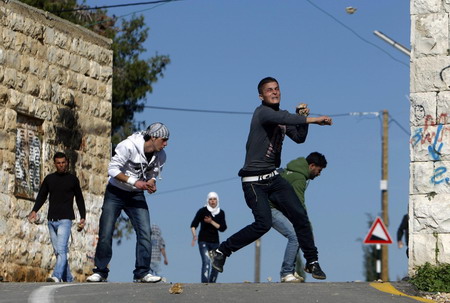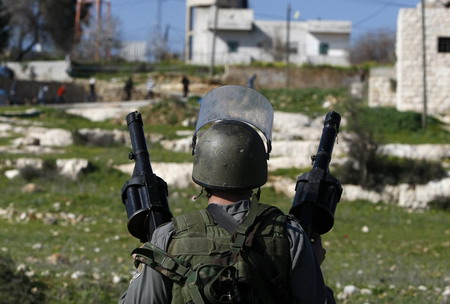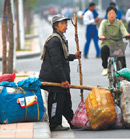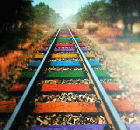Global General
With peace talks frozen, Palestinians back protests
(Agencies)
Updated: 2010-01-24 19:58
 |
Large Medium Small |
|
 A Palestinian throws a stone towards Israeli Border police during a protest in the West Bank village of Nabi Saleh near Ramallah January 22, 2010. [Agencies] |
But if the United States is unable to get peace talks going again soon, wider mobilisation may be inevitable. US President Barack Obama said last week he had underrated the difficulty of reviving deadlocked Middle East negotiations.
"When hope in negotiations retreats, this increases hope in other options. All the while the military option is unlikely, the option of popular resistance is the only game in town," political analyst Hani Masri said.
"There are no clear indications at the present time that we are talking about a mass movement," said George Giacaman, a political scientist at Birzeit University near Ramallah.
"But these things are hard to gauge," he said. "The first Intifada broke out when economic conditions were far better than they are now."
The first Intifada, or uprising against Israel, erupted in the occupied territories in 1987. It is remembered abroad for scenes of youths armed with stones and slingshots confronting the Israeli army.
This differentiated it from the second, more militarised Palestinian uprising, which began in 2000 and lasted several years.
Crackdown
"The first Intifada was a model in which all Palestinians take pride, and this model is the one that can restore the Palestinian question to the political map," Fahmy Zaareer, a senior Fatah leader, told Reuters.
Israel's international image, which suffered in the first Intifada, has been stung again by world criticism of its offensive in the Gaza Strip a year ago, which it said was launched to halt rocket attacks from the territory.
International criticism has also focused on a blockade imposed by Israel on Gaza, where conditions have gone from bad to much worse.
Israel wants to avoid more bad press, hence its efforts to nip the protests in the bud now, said Jonathan Pollak, spokesman for the Popular Struggle Coordination Committee.
"They are trying to repress it now before too much damage is done," he said.
Protest organisers say a crackdown has intensified in the past month. Since December, 20 Palestinians have been arrested in the village of Nilin in connection with protests against part of the wall and fence "security barrier" Israel is building in and around the West Bank, they say.
An Israeli military official said there had been no change in policy towards demonstrations and the army had no problem with peaceful protest.
"The problem is when these demonstrations invariably and quite deliberately become violent." he said.
|
 An Israeli Border police officer holds tear gas launchers during a protest in the West Bank village of Nabi Saleh near Ramallah January 22, 2010. [Agencies] |











